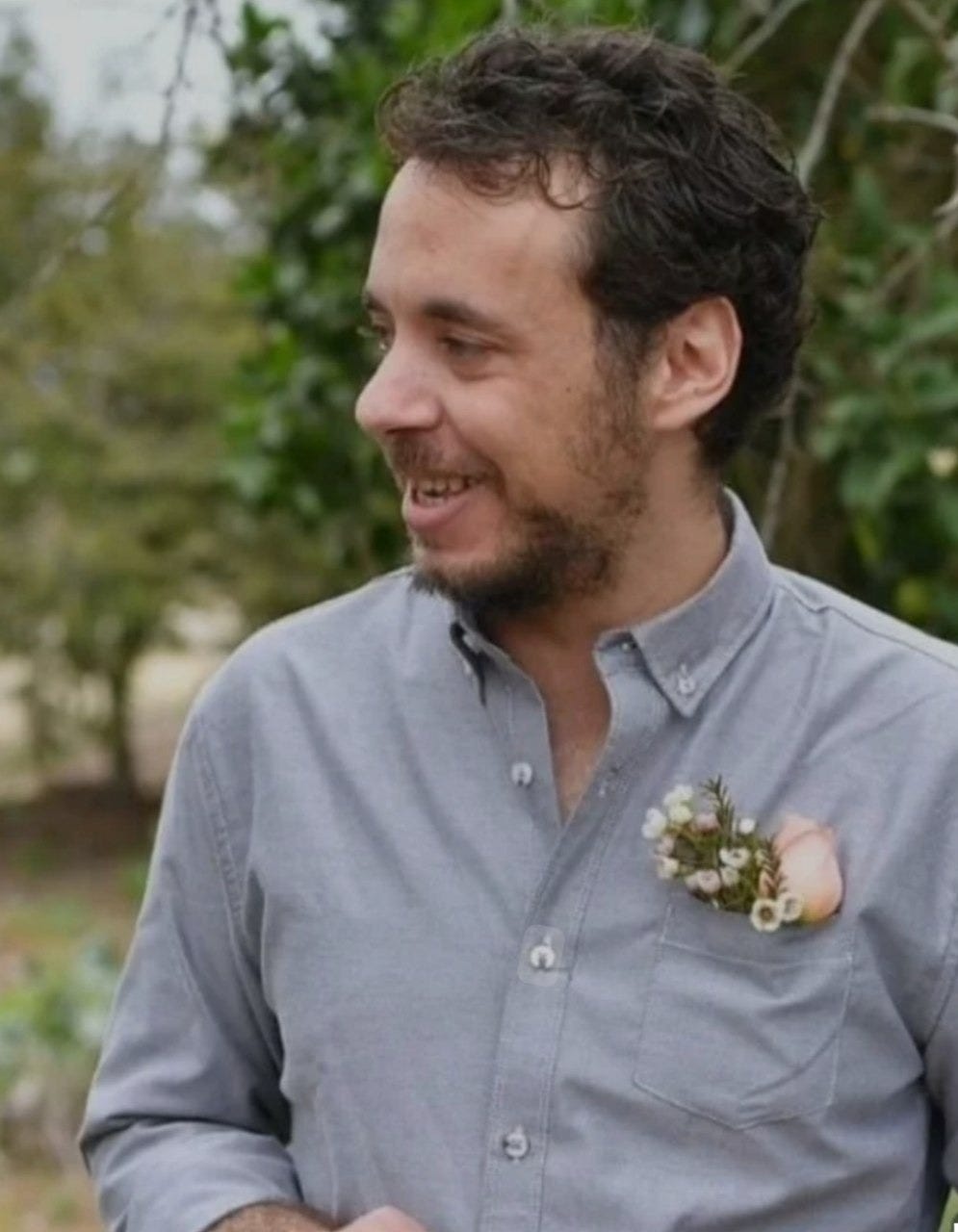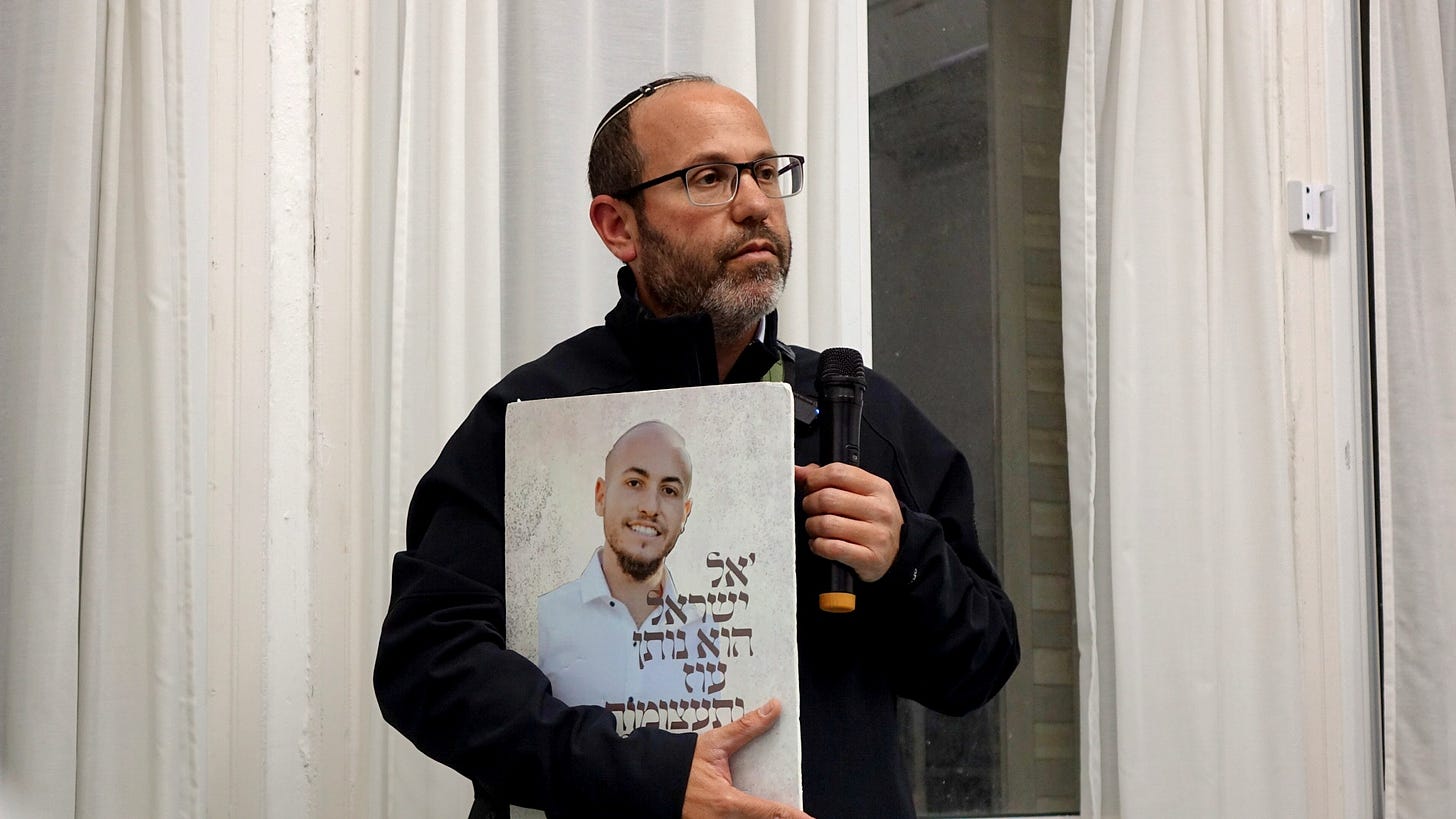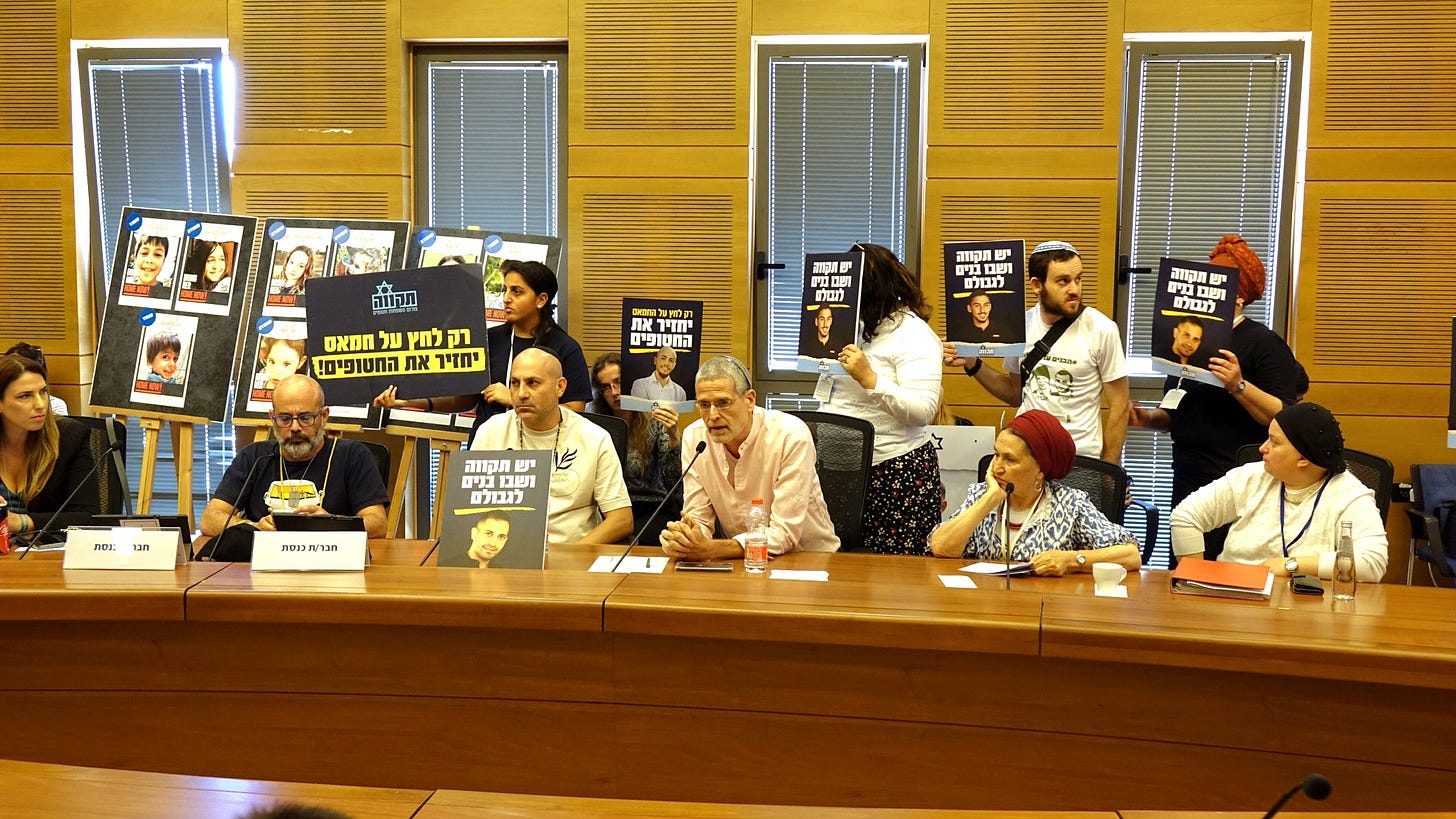

Author’s note: This article was written on July 9th, 2024, and published in the 21st edition of Perspectives Magazine which was released on September 23, 2024. Since the article was written we were notified of the deaths of some of the hostages mentioned in this article. As of publication, 107 hostages remain in Gaza.
Do you believe your home is your sanctuary? Going to sleep safely in your own bed is a comfort most people take for granted. That basic feeling of security was ripped from every single Israeli on October 7th.
Hostages were taken from the kibbutzim, army bases, and the Nova party. This made it impossible to dismiss the horror as belonging only to a certain segment of society, it personally touched Israelis from all walks of life and all areas of the country.
And this brought home the realization that any of us could have been in the place of the hostages or their immediate families.
My friend’s daughter was murdered at the Nova site. Friends of mine were murdered in Be’eri. Friends from other kibbutzim survived to live with the trauma. Friends and neighbours of my sons were killed in action. On top of that, we worry about our sons’ safety while they do their IDF reserve duty.
Not having direct friends or family taken hostage does not reduce my feeling of helplessness, frustration, or anguish for the hostages or their families.
But what could I do to help? Not much. So, I did (and do) what I can to stand with the families in their activities, provide whatever kind of assistance I can, listen, and give them the feeling that they are not alone. If I can help with professional advice, help amplify their voices, or do something as simple as bringing water or handing a tissue to someone crying, that is better than not doing anything.
On numerous occasions, I have spoken with family members of different hostages. Some I have gotten to know well. All evoke the deepest empathy – if you really listen to them.
Most of all, the different families have taught me lessons in humility and strength.
In Israel, there is an idea – a norm – that bereaved families are not to be judged. Those who lost their beloved because they were Jews, those who died defending us or who could have just as easily been us, have a different, almost holy status. They are allowed to do or say anything they feel and society needs to embrace them. In Hebrew, the concept is to “contain their emotions,”, like a jar that holds contents without judgement. By extension, it is a societal consensus that the families of hostages are understood to belong to this category.
Never has this idea been tested to the extent that it is with the hostages.
Every Israeli wants the hostages returned home. Those who are still alive and those who were murdered need to be returned to their families for the simple reason that they are ours. They are family and family needs to be at home.
The problem is that there are vehement disagreements about how to return the hostages. The method chosen has ramifications for the individuals and the Nation of Israel as a whole – Israelis and Jews worldwide. Compounding the issue is the fact that this is being tainted by politics, creating division and blindness where none should exist. This is an issue of survival and something we should all be unified around. If the enemies of Jews learn that they can take hostages with impunity this will become a methodology and no Jew on earth will be safe.
So how do you “contain the emotions” of people whose actions you vehemently disagree with?
Had I only seen these families on the TV screen, I am not sure I would have succeeded in embracing in my heart those who behave in ways that seem destructive to me. Listening to them and seeing more than what the media chooses to present gave me valuable insight. Most of all, it gave me the ability to breathe, step back, and respond with humility – although, like everyone in the country, I too am distraught and concerned about what this all means for our future.
I watched Esther Buchshtab (mother of hostage Yagev Buchstab) listening to an argument between Ayala Metzger (daughter-in-law of hostage Yoram Metzger) and Vered Ansbacher whose brother Yehuda was killed in action in Gaza. Vered was advocating for military pressure on Hamas to protect the future of Israel and as the best way to incentivize the release of hostages. Ayala, who believes that negotiating a deal is the only way to secure the release of the hostages, accused Vered: “You are putting the dead [her brother] before the living!” Vered, trying to bridge the gap between them, responded: “I’m not doing anything for my brother. He’s dead. I’m worried about the safety of everyone who is alive, for the rest of my family, for our future.”

I could see that Esther Buchshtab was visibly shaking with the emotions she was trying to contain. She turned to me with her eyes wide like saucers but her voice flat and said: “I don’t want any military activity [no matter what is right]. Sinwar is holding my son close to him and any attempt to eliminate Sinwar will mean my son’s death.”
For a moment I felt like I couldn’t breathe. For a moment I felt what she feels EVERY moment.
Ayala Metzger has been one of the more prominent hostage family members in the demonstrations against the government. I’ve seen her block roads, scream at members of Knesset and disrupt other hostage family members who were expressing ideas contrary to hers. I’ve also sat on the floor with her and asked her how she feels, quietly, when no one else was around. She told me about waking up, shaking in terror from nightmares about being hostage in Gaza. About her mother-in-law who was released from Hamas captivity and her father-in-law, Yoram Metzger, whose body is still there [and was retrieved along with that of Yogev Buchstab on August 20th]. She told me about the terrible frustration of not seeing the government act in a way she believes will create a solution. She asked me: “Is it reasonable that I, a private person, had to become a public person, so much that I even hired a media spokesman to help me deal with all of this?! Why do I have to do this?”
I’ve also heard her shout in response to Tzvika Mor (whose son Eitan is a hostage in Gaza): “You say that the State must go to battle and overpower the enemy to get back the hostages. I am willing to go with you on that, but the State is not fighting full force or making a deal and the hostages are still there!”
Are provocative actions and harsh words helpful in getting the hostages back? They are helpful when your goal is to retain media attention. Ayala believes that pressure on the Israeli government via the media and demonstrations in the streets will bring us closer to a solution. I believe that pressure needs to be put on the enemy, on Hamas and their enablers. I believe that pressure in the wrong places weakens us and takes us further from the solution we all want – but I understand Ayala.
I don’t have to agree with her to feel her pain and frustration. Or to realise that we all want the same thing – for the hostages to be released and to be safe.
Tzvika Mor taught me a different lesson in humility – were I in his shoes, would I be able to comport myself with the level of dignity and concern for national interest that he has?
Tzvika’s son Eitan was working as a security guard at the Nova Festival. Instead of thinking about his own safety, Eitan stayed on site, helping others escape the attackers. For some two hours, he did this, while people were being slaughtered all around them. He and some other guards went looking for more survivors. They found a few dozen and helped them hide in bushes in a valley. Eitan and another security guard came out of hiding to see what was going on. They chased off Gazans who came with knives and axes. That’s when they found the corpse of a young woman who had been brutally violated. They could not bear the thought that on top of the horror she had experienced before death, the attackers would further abuse her body, taking it to Gaza so they hid her body and returned to the group. That’s when the terrorists shot an RPG at them. The group scattered in all directions. The other security guard survived, making it possible to tell the Mor family what Eitan had done and bring the young woman to burial.
Tzvika tells me: “We know that Eitan was taken across the border to Gaza alive. One of the released hostages in the deal that took place a month into the war reported seeing Eitan and speaking with him. There has been no sign of life since. What we do know is that he is strong both physically and mentally. If anyone is capable of surviving this, it’s Eitan – and for him, the most natural thing to do would be to do everything in his power to bolster the wellbeing of other hostages.’”
About how his family is coping, Tzvika explains: “I draw my strength from my public mission, reaching out to the Israeli public and to our politicians with the message that we must be strong, confident and proud. The only way to release the hostages and protect our future security is through strength. The enemy will make a deal when they understand they have no other choice, not before. We cannot make a partial deal that leaves my son and others behind. We must vanquish them so totally that they and all our other enemies who are watching understand they can never do this again. That is how I will get back my son.
“My wife went back to work almost full-time. This helps maintain stability. She’s a kindergarten teacher. The children need her and it helps her as well. All our children returned to their regular schedules and we try to maintain normality as much as possible. We made a conscious decision to have a happy home. Hamas stole my son, should I let them steal our happiness as well?”
When I asked Tzvika what he would like to say to the readers of this article he paused and said: “Who will read this? Jews? From the UK? Europe? My gut says to tell them: Make Aliyah. Come home. Your lives will become unbearable there.”
I know Tzvika so I didn’t find his answer surprising, but I still find it extraordinary. How does a father, whose son is a hostage in Gaza, not knowing if he is dead or alive tell other Jews – I am worried about you. Come be where I am?
Wow. Just wow.
When I asked Rabbi Shimon Or what message he would like to convey to the readers of this article he had a different request.
Rabbi Or is the uncle of Avinatan Or. The world was introduced to Avinatan in the heart-wrenching Hamas video of them taking Noa Argamani on a motorcycle into Gaza as she reaches out in terror to her boyfriend, Avinatan. We all celebrated the heroic rescue of Noa but sadly she is unable to shine any light on Avinatan’s fate. Since the moment they were separated there has been no sign of life from Avinatan.
Rabbi Shimon Or has been advocating for the Or family, speaking in the Knesset and other public forums, trying to shoulder that burden for Avinatan’s parents. Avinatan’s father Yaron, Shimon’s twin brother, has more difficulty speaking in public. Worry over the fate of his son has made him physically ill. The stress has taken a physical toll on Shimon as well but they brush off their damaged health because Avinatan and the future of Israel matter more. Avinatan’s mother Ditza focuses on spiritual strengthening and prayers, taking care of herself and empowering others.
Rabbi Or, says: “I want to explain two important points. The first is that we all want the same thing. Sometimes the media makes it seem as if there is an argument between different families of hostages but even between those of us who disagree on how to bring them home, there is camaraderie. Most of the families disagree with the idea of setting the streets on fire to get our loved ones back. Political division is being sown but that comes from the media, not the families. PR activities of those promoting a political agenda make it seem as if more people agree with them than actually do. The truth is that we are unified even if we are not identical.
“As a religious man who has studied Islamic culture, I am striving to open people’s eyes to a critical cultural misconception here that we need to bridge to solve this problem. There is the Western idea that the individual is more important than the nation. But that is not the way it works in the Middle East. Moreover, Islamic culture, the Hamas version, does not accept honest negotiations with non-Muslims. They accept a truce for the purpose of regrouping and renewing their attack – and this only in situations when they find themselves extremely weakened or on the verge of being destroyed. Hamas itself was founded on the idea that previous Arab losses were a result of not being religious enough. For these reasons, Hamas will never agree to return the hostages. That means that only we can make it happen, and to do so, we need to stop courting Hamas, stop trying to create a deal they will never uphold and make sure that the people of Gaza understand that Hamas is not staying in power. When that happens, Gazans will no longer benefit from holding the hostages and they will find ways to return them to us. We need our brothers and sisters to understand these principles so that we can be certain and strong in their support for Israel continuing this war – because that is how we bring the hostages home and ensure safety for us all.”
Israelis and Jews abroad may not always feel like one family. Sometimes it takes those who hate us to remind us that this is a fact. At the moment we are a family of hostages. We don’t have to agree on how to address this terrible situation. What we do need is to retain unity in mutual respect and compassion, to bring our family home, and make sure that our enemies and everyone watching understand that we meant it when we said NEVER AGAIN.
{Reposted from the author’s blog}






![Why You Shouldn’t Be Afraid of G-d – Soul Talk [audio]](https://c622d1ec.delivery.rocketcdn.me/wp-content/uploads/2025/03/light-4681014_640-218x150.jpg)
![Modesty & Matzah – Pull Up a Chair [audio]](https://c622d1ec.delivery.rocketcdn.me/wp-content/uploads/2025/03/matzah-1566456_640-218x150.jpg)

















